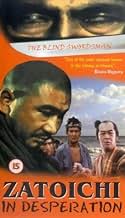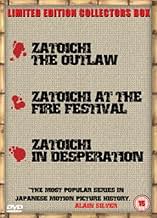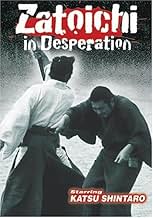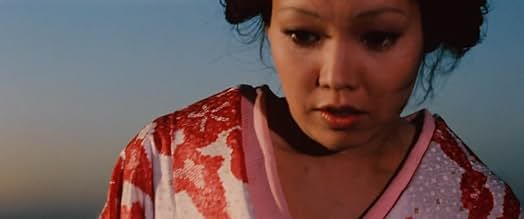AVALIAÇÃO DA IMDb
6,8/10
1,2 mil
SUA AVALIAÇÃO
Adicionar um enredo no seu idiomaAfter accidentally causing an old lady's death, Zatoichi seeks out her daughter to atone for the tragedy, consequently getting into all sorts of trouble.After accidentally causing an old lady's death, Zatoichi seeks out her daughter to atone for the tragedy, consequently getting into all sorts of trouble.After accidentally causing an old lady's death, Zatoichi seeks out her daughter to atone for the tragedy, consequently getting into all sorts of trouble.
- Direção
- Roteiristas
- Artistas
- Direção
- Roteiristas
- Elenco e equipe completos
- Produção, bilheteria e muito mais no IMDbPro
Avaliações em destaque
Zatoichi in Desperation is the twenty-fourth entry in the Japanese franchise about the blind masseur, skilled swordsman and lowly yakuza with the strong moral compass. The film is the first to be directed by leading actor Shintaro Katsu. This movie starts in an unusual way as Zatoichi comes across an old woman who plays the shamisen. They cross a dilapidated bridge and have a short conversation. Zatoichi wants to give the old woman some money but she slips and falls to her death. Zatoichi feels responsible for the terrible accident and decides to visit the old woman's daughter who turns out to be a manipulative prostitute. The blind yakuza still wants to help and buy her freedom. In order to get the fifty ryo to buy her freedom, he goes to a gambling house where he gets in conflict with the local boss and his mob. The criminals are aware of Zatoichi's identity which is also the case for a wandering swordsman and a group of thugs who all want to earn the bounty on his head. In his search for forgiveness, the blind masseur soon has to fight off yakuza, swordsmen and criminals and has to deal with a prostitute whom he cannot trust.
There are a few interesting elements about this movie. First of all, the movie features some psychedelic flashbacks, supported with funky music that make the influence of the seventies' cultural trends quite obvious. Secondly, the locations are quite intriguing as the story takes place in a small town by the sea and shows the rough everyday life of exploited fishermen. Thirdly, Zatoichi gets severely injured in this movie and has to use a new technique to fight off his numerous enemies in a stunning fight sequence in the sandy town.
Despite these fresh elements, the film also has considerable downsides. The characters are neither fleshed out nor sympathetic which leads to the problem that one only cares about Zatoichi's fate. The plot starts interestingly but slows down and wastes a lot of time through a tedious middle section. The final duel between Zatoichi and a swordsman lasts for about ten seconds and looks ridiculous. Several parts of the movie feel rushed and the unusual shaky camera work makes it look like a low quality entry in the franchise.
Overall, Zatoichi in Desperation is among the weaker entries in the franchise. It has a few fresh ideas concerning camera work, score and special effects but the story and characters are too uninteresting to be memorable. I would only recommend this film to fans of old date. Those who aren't familiar with the blind swordsman yet should either start discovering the movies in chronological order or give Takeshi Kitano's version a chance.
There are a few interesting elements about this movie. First of all, the movie features some psychedelic flashbacks, supported with funky music that make the influence of the seventies' cultural trends quite obvious. Secondly, the locations are quite intriguing as the story takes place in a small town by the sea and shows the rough everyday life of exploited fishermen. Thirdly, Zatoichi gets severely injured in this movie and has to use a new technique to fight off his numerous enemies in a stunning fight sequence in the sandy town.
Despite these fresh elements, the film also has considerable downsides. The characters are neither fleshed out nor sympathetic which leads to the problem that one only cares about Zatoichi's fate. The plot starts interestingly but slows down and wastes a lot of time through a tedious middle section. The final duel between Zatoichi and a swordsman lasts for about ten seconds and looks ridiculous. Several parts of the movie feel rushed and the unusual shaky camera work makes it look like a low quality entry in the franchise.
Overall, Zatoichi in Desperation is among the weaker entries in the franchise. It has a few fresh ideas concerning camera work, score and special effects but the story and characters are too uninteresting to be memorable. I would only recommend this film to fans of old date. Those who aren't familiar with the blind swordsman yet should either start discovering the movies in chronological order or give Takeshi Kitano's version a chance.
Katsu Productions was at a high level of output at this time. Katsu was producing the Zatoichi series, the Lone Wolf series, the Hanzo the Razor trilogy, the Mute Samurai television series and the Lone Wolf television series. All within a span of two years. In addition to acting in several of these efforts (of course) he also took the director's chair on several occasions. This man had a lot of energy.
While sometimes actors who take the helm show a lack of concern with the visuals preferring to focus on the performances, Katsu is an exception. The visual style here is unlike any other Zatoichi I've seen and in fact unlike most other chambara films. Everything is shot in deep focus with moody lighting and stark saturated colors. The style is somber and depressing. The next (and last in the series) Zatoichi film is back to the standard look. If you like this film I would suggest looking into Katsu's Oshi Samurai series which continues the atmosphere.
One of the best Zatoichi films but not similar to the others. Recommended but prepare for a somber experience.
While sometimes actors who take the helm show a lack of concern with the visuals preferring to focus on the performances, Katsu is an exception. The visual style here is unlike any other Zatoichi I've seen and in fact unlike most other chambara films. Everything is shot in deep focus with moody lighting and stark saturated colors. The style is somber and depressing. The next (and last in the series) Zatoichi film is back to the standard look. If you like this film I would suggest looking into Katsu's Oshi Samurai series which continues the atmosphere.
One of the best Zatoichi films but not similar to the others. Recommended but prepare for a somber experience.
'Zatoichi In Desperation' was the 24th movie in the long running and very popular martial arts series starring Shintaro Katsu as Zatoichi the blind master swordsman and masseur. Zatoichi, for those that don't know is a ronin (a wandering samurai), very quiet and unassuming with a wry sense of humour, but an absolute killing machine when crossed! In this episode he encounters an old woman while crossing a bridge, and after a brief conversation with her, she tragically falls to her death. Upset, Zatoichi sets off to a nearby town to look for the woman's daughter Nishikigi to break the news to her. He eventually finds her working as a geisha and learns she only needs to pay a debt of fifty ryo to buy her freedom. Zatoichi becomes obsessed with raising the money and in doing so ignores the hardships experienced by the local fisherman caused by the local evil boss Mangoro. But when Mangoro kidnaps Nishikigi everything comes to a head in a brutal climax, and Zatoichi must save her and his own life. I can't claim to be any kind of Zatoichi expert, but he's a most intriguing character, and Katsu plays the role masterfully. I highly recommend 'Zatoichi In Desperation'.
The following review is an extract from the book "Shintaro Katsu´s Zatoichi: Complete guide to all movies", which is now available on Amazon.
Zatoichi crosses a bridge with a woman who plays the shamisen. The old woman warns him to be careful, for the wood of the bridge has holes, and it is easy to fall if one does not pay attention. The two talk briefly, and the lady asks the blind man where he is going. "Nowhere in particular, wherever the wind takes me", replies the wandering masseur. The old woman replies that she intends to visit her daughter, who works in a geisha house called Ogiya in a nearby town. Moments after they have said goodbye, the blind man has the idea of offering some coins to the old woman, as a tip for playing the shamisen so well... The grateful woman is about to take the coins, but distracted by the surprising gift, slips, loses her balance and falls into the void... She, who had recommended to the blind man to be very careful.
Zatoichi feels guilty for the deadly accident of the poor woman. Unlike its owner, the instrument has remained on the bridge and the masseur picks it up. With the shamisen he walks towards the city of which the deceased spoke to him, to look for his daughter, the geisha, in Ogiya.
(...)
This, the 24th and penultimate, is one of the two films in the saga directed by actor Shintaro Katsu himself, who also acted as co-producer. The other, also directed by Katsu, is the last of the originals (called "Zatoichi" just like that), which was filmed many years later - in 1989 - and where you can see an already grayed and almost old Ichi.
"Zatoichi in desperation", as its title already indicates, is fraught with deep pessimism. Oppressive and dark, sad, depressing and hopeless. Tragically and emotionally brutal.
It also has an undeniable poetic undertone.
Zatoichi crosses a bridge with a woman who plays the shamisen. The old woman warns him to be careful, for the wood of the bridge has holes, and it is easy to fall if one does not pay attention. The two talk briefly, and the lady asks the blind man where he is going. "Nowhere in particular, wherever the wind takes me", replies the wandering masseur. The old woman replies that she intends to visit her daughter, who works in a geisha house called Ogiya in a nearby town. Moments after they have said goodbye, the blind man has the idea of offering some coins to the old woman, as a tip for playing the shamisen so well... The grateful woman is about to take the coins, but distracted by the surprising gift, slips, loses her balance and falls into the void... She, who had recommended to the blind man to be very careful.
Zatoichi feels guilty for the deadly accident of the poor woman. Unlike its owner, the instrument has remained on the bridge and the masseur picks it up. With the shamisen he walks towards the city of which the deceased spoke to him, to look for his daughter, the geisha, in Ogiya.
(...)
This, the 24th and penultimate, is one of the two films in the saga directed by actor Shintaro Katsu himself, who also acted as co-producer. The other, also directed by Katsu, is the last of the originals (called "Zatoichi" just like that), which was filmed many years later - in 1989 - and where you can see an already grayed and almost old Ichi.
"Zatoichi in desperation", as its title already indicates, is fraught with deep pessimism. Oppressive and dark, sad, depressing and hopeless. Tragically and emotionally brutal.
It also has an undeniable poetic undertone.
It started up well, yet, at a certain point the script turned to a level of imbecility comparable with a big studio US creation. Well, compared with the level of the US Academy this can easily can take an Oscar for best script.
On the other hand this movie achieves something almost unique. The visual style is so unusual (especially for somebody used with the standard blockbuster) that both makes the film unforgettable and hard to watch. In my opinion this is what Mean Streets and The Killing of a Chinese Bookie should have looked like if the tech team involved would have been skilled enough. The gambling scene alone makes Rounders look like a half baked high-school project (which is not far from the truth anyway).
A 6 for cramming so much into this movie. You have a social message, the indolence of the rich (the young watching the fishermen's boats burn), the unromaticised noblemen, etc.
Contact me with Questions, Comments or Suggestions ryitfork @ bitmail.ch
On the other hand this movie achieves something almost unique. The visual style is so unusual (especially for somebody used with the standard blockbuster) that both makes the film unforgettable and hard to watch. In my opinion this is what Mean Streets and The Killing of a Chinese Bookie should have looked like if the tech team involved would have been skilled enough. The gambling scene alone makes Rounders look like a half baked high-school project (which is not far from the truth anyway).
A 6 for cramming so much into this movie. You have a social message, the indolence of the rich (the young watching the fishermen's boats burn), the unromaticised noblemen, etc.
Contact me with Questions, Comments or Suggestions ryitfork @ bitmail.ch
Você sabia?
- CuriosidadesOnly film in the original series directed by Zatoichi himself, Shintarô Katsu. He would go on to direct one more, Zatoichi: A Escuridão é sua Aliada (1989).
- Citações
Boss Mangoro Kagiya: Please enjoy watching as Zatoichi meets his end.
- ConexõesFollowed by Mang jian xue di zi (1973)
Principais escolhas
Faça login para avaliar e ver a lista de recomendações personalizadas
- How long is Zatoichi in Desperation?Fornecido pela Alexa
Detalhes
- Data de lançamento
- País de origem
- Idioma
- Também conhecido como
- Zatoichi in Desperation
- Empresas de produção
- Consulte mais créditos da empresa na IMDbPro
- Tempo de duração1 hora 35 minutos
- Mixagem de som
- Proporção
- 2.35 : 1
Contribua para esta página
Sugerir uma alteração ou adicionar conteúdo ausente

Principal brecha
By what name was A Última Cilada (1972) officially released in India in English?
Responda





























